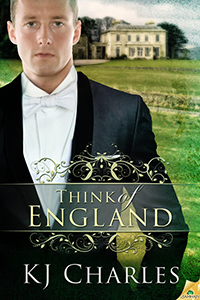Names are incredibly important for me in visualising characters. I can’t see a character properly till I have a name. I couldn’t start my most recent MS, Jackdaw, for days because I had sort of decided that the hero’s name was Ian Spencer and it…just… No. Sorry. Nothing against the name as such, apologies if it’s yours, but ‘Ian Spencer’ is not a person in my head and the character simply wouldn’t come into focus. Then I realised he was actually Ben Spenser – Benedict, not Benjamin, and with the s in the surname – and I wrote the thing in ten weeks.
My new book Think of England features Archie Curtis. I got that one right away. Old-fashioned first name, shortened in that rather schoolboyish way of the unsophisticated Edwardian male; strong-sounding surname that suggests reticence. Just right for this rather inarticulate, somewhat emotionally repressed, mentally Victorian, physically powerful well-bred chap.
But there was something nagging at me, as I wrote the opening chapter, and I realised what it was. Curtis is the surname of a Victorian hero: Sir Henry Curtis of King Solomon’s Mines.
…perhaps the biggest-chested and longest-armed man I ever saw. He had yellow hair, a thick yellow beard, clear-cut features, and large grey eyes set deep in his head. I never saw a finer-looking man, and somehow he reminded me of an ancient Dane.
As it happened, my Archie Curtis is also a big blond of Viking looks. Clearly, he and Sir Henry were related.
I love fiction that nods to an existing world. So I decided, purely for my own entertainment, that Archie Curtis was the orphaned-at-birth son of Sir Henry’s youngest brother (who is not mentioned in King Solomon’s Mines on account of being dead). I didn’t have a plan for that. I didn’t think I was going to mention it in the book, even. It was just a link in my head for my own satisfaction.
But having that titbit in mind brought up a surprising number of things. Archie is a pretty typical man of his time (mostly), brought up in a period of imperialism and anti-Semitism and Britannia ruling the waves. But Sir Henry Curtis is extremely well-travelled, which would feed into Archie’s world view and give him a little bit more openness towards other faiths and races. There were repercussions from Sir Henry’s fame, there was Archie’s likely upbringing…
And there was the Kukuana Place of Death.
This part of King Solomon’s Mines is the most iconic scene in Victorian pulp literature. Our heroes visit an underground chamber of stalactites and strange rock formations, in which is a stone table headed by a gigantic statue of a skeleton. Seated around it are mounds of rock, some things that look weirdly like corpses under stone veils, and the body of Twala, who Sir Henry has just killed:
Over the surface of the corpse there was gathered a thin glassy film, that made its appearance yet more appalling, for which we were, at the moment, quite unable to account, till presently we observed that from the roof of the chamber the water fell steadily, drip! drop! drip! on to the neck of the corpse, whence it ran down over the entire surface, and finally escaped into the rock through a tiny hole in the table. Then I guessed what the film was–Twala’s body was being transformed into a stalactite.
Come on. How could I resist.
I couldn’t get away with turning people into stone in a book set in the north of England (here, anyway. One day…). But the central act of Think of England came out as it did because I was thinking about this scene and the characters were talking about it.
So, for anyone who’s interested in how the creative process works: a random surname choice led to a throwaway tribute to a favourite book, which led to character development, plot points and finally a major scene. And if you can draw any usable writing tips from that, you’re welcome.
Think of England is published by Samhain on 1 July.
Lie back and think of England…
England, 1904. Two years ago, Captain Archie Curtis lost his friends, fingers, and future to a terrible military accident. Alone, purposeless and angry, Curtis is determined to discover if he and his comrades were the victims of fate, or of sabotage.
Curtis’s search takes him to an isolated, ultra-modern country house, where he meets and instantly clashes with fellow guest Daniel da Silva. Effete, decadent, foreign, and all-too-obviously queer, the sophisticated poet is everything the straightforward British officer fears and distrusts.
As events unfold, Curtis realizes that Daniel has his own secret intentions. And there’s something else they share—a mounting sexual tension that leaves Curtis reeling.
As the house party’s elegant facade cracks to reveal treachery, blackmail and murder, Curtis finds himself needing clever, dark-eyed Daniel as he has never needed a man before…
Drop by at my new website!


July 1 cannot come soon enough. I am already hooked. In a good way.
Looking forward to this one for sure! Always fascinated by “story behind the story” info, thanks for sharing
Am so looking forward to this book it sound so much fun, will want to read it slowly but not much chance of that happening.
Thanks all! I am also dying for it to come out. No self control…
[…] Love Bytes – How a surname shaped Think of England […]